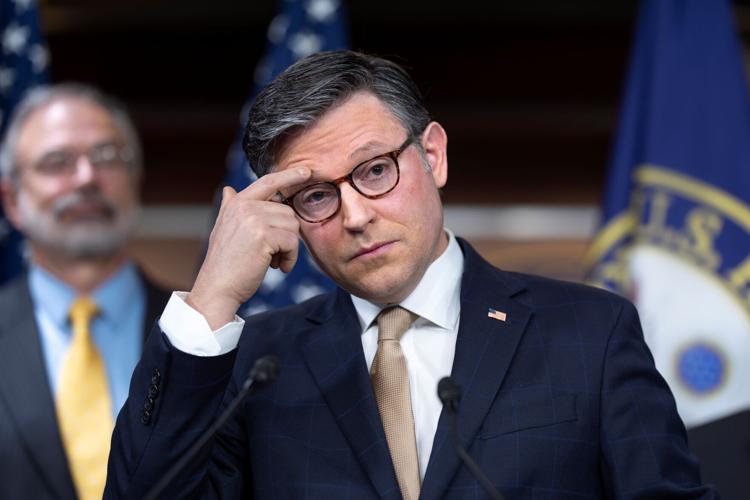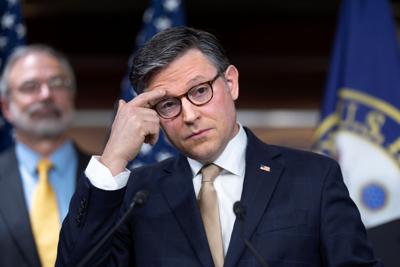Louisiana’s citizens need U.S. Speaker of the House Mike Johnson to stand up for their interests and exert Congress’ constitutional power and duty over trade and tariffs, not kowtow servilely to President Donald Trump.
Start with Johnson’s duty — indeed, the duty of every member of Congress, but especially that of the speaker as the guardian of Congress’ institutional prerogatives — to follow the letter and spirit of the Constitution. The Constitution could not be clearer: “ To lay and collect Taxes, Duties, Imposts and Excises.”
Congress, not the president.
It is true that in several constitutionally dubious delegations of that authority, the president some unilateral tariff powers — but even then only in cases of national “emergency,” when threats exist to national security, when foreign countries restrict U.S. commerce in “unjustifiable,” “unreasonable” or “discriminatory” ways, and the like.
And while those dubious grants of authority leave some wiggle room for interpretation, the words “emergency” and “national security” aren’t open-ended. They have real meanings, and those meanings do restrict the president’s power — especially when considering that they are clearly exceptions to the Constitution’s specificity about Congress, not the president, having authority over tariffs.

Quin Hillyer
In other words, if there’s any doubt as to whether the president can impose a tariff without Congress’ specific assent, the answer must be “no.” Otherwise, the Constitution’s careful balancing of power begins to wobble in the direction of authoritarian presidential control. In this case, Trump is citing the “emergency” power excuse, even though there is no remotely reasonable way that a mere trade deficit, during a full-employment economy, fits any dictionary or statutory definition of “emergency.”
If there is any one person in the country most obligated to safeguard Congress’ authority and prerogatives vis-à -vis the president, it is the speaker of the House. The speaker’s office is specifically mentioned in the Constitution and, unlike the nation’s vice president (who shares executive and legislative duties), the speaker is the only specifically named officer who represents only the legislature’s institutional interests.
That’s the first reason why Johnson’s servility to Trump — in general, actually, but specifically with regard to Congress’ constitutional power over tariffs — is so inexcusable. Asked on April 7 whether he would allow the House to vote on reclaiming the tariff authority it already is supposed to exercise, Johnson answered like a minor functionary, not an independent constitutional officer.
“You’ve got to give the president the latitude, the runway, to do what it is he was elected to do,” . And, later in his answer: “We’re going to give him the space necessary to do it.”
This is, well, pathetic. Congress, not the president, is elected to take the lead on trade policy. End of story. And the speaker, more than anyone else on the planet, is supposed to insist on that. After all, the public elects senators and representatives just as the public elects the president. Especially in the U.S. system, those congressional elections are for delegates to exercise independent judgment on behalf of individual constituencies, not act as rubber stamps for the president.
In this case, unprecedentedly huge tariffs not only are terrible macro-economic policy for the country as a whole (although that’s an argument for another day), but they are particularly harmful for Johnson’s own Louisiana constituency. The whole point of tariffs is to discourage imports of foreign goods. That means, of course, far less business for ports and the cities and states that rely on trade.
By tonnage, Louisiana boasts four of the ten busiest ports in the nation. Louisiana’s economy would be horribly hobbled by a Trumpian trade war. It is no wonder that a host of Louisiana importers and already are raising a stink against tariffs.
While the directors of the Port of New Orleans have been circumspect, other port leaders () are openly asking Trump to stop his madness. And Cary Davis, president and CEO of the American Association of Port Authorities, said the tariffs are a bad idea that will amount to “raising prices across the economy.”
Louisiana’s energy industry, a linchpin of the economy, also is likely to take a major blow, as tremendously from a trade war. Why would Johnson allow this?
One is tempted to ask him, as actor Robin Williams’ character asked a student in Dead Poets Society, “”
By standing up neither for Louisiana nor for the powers of the House, Johnson shows more likeness to a paramecium.



